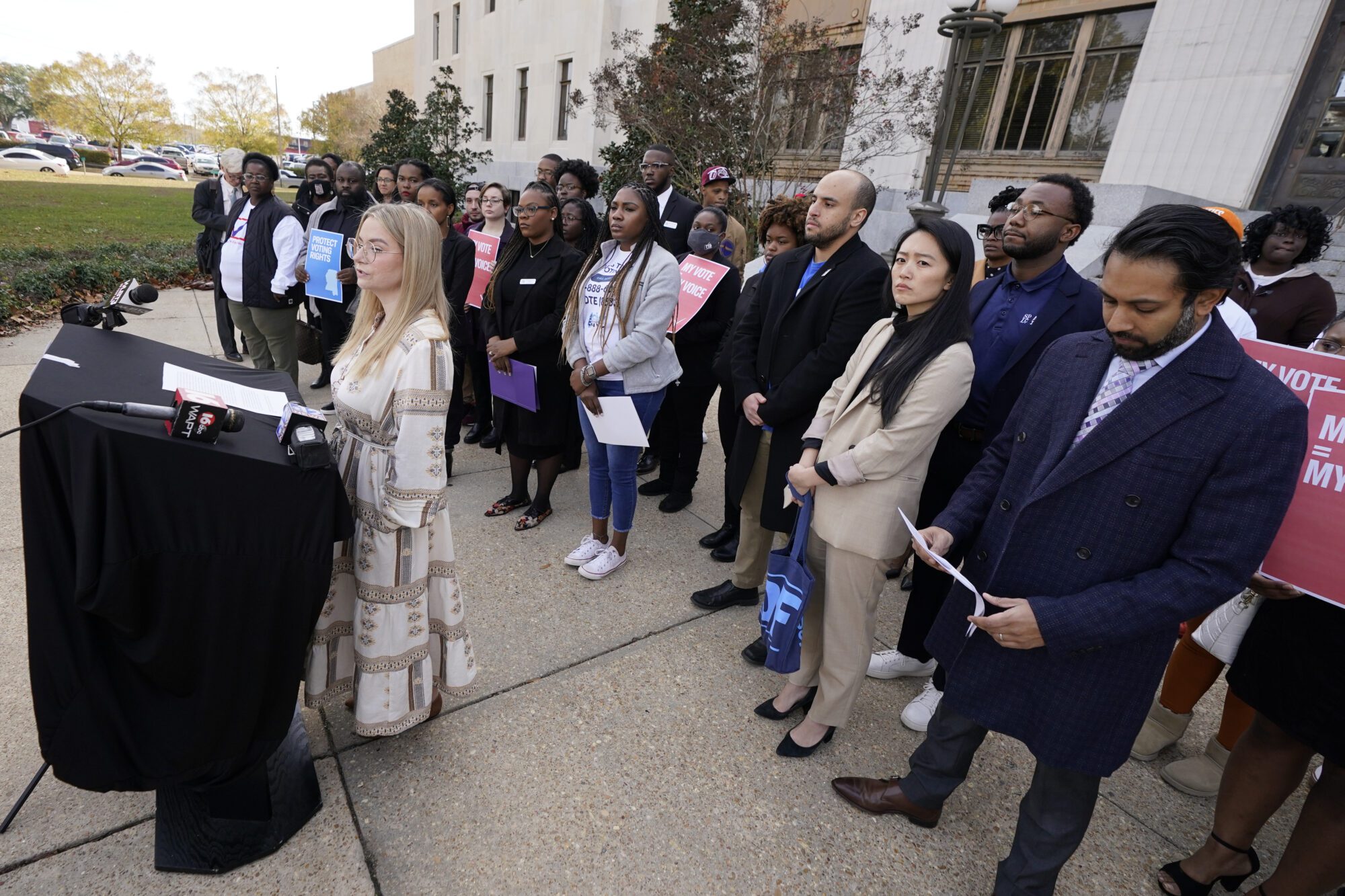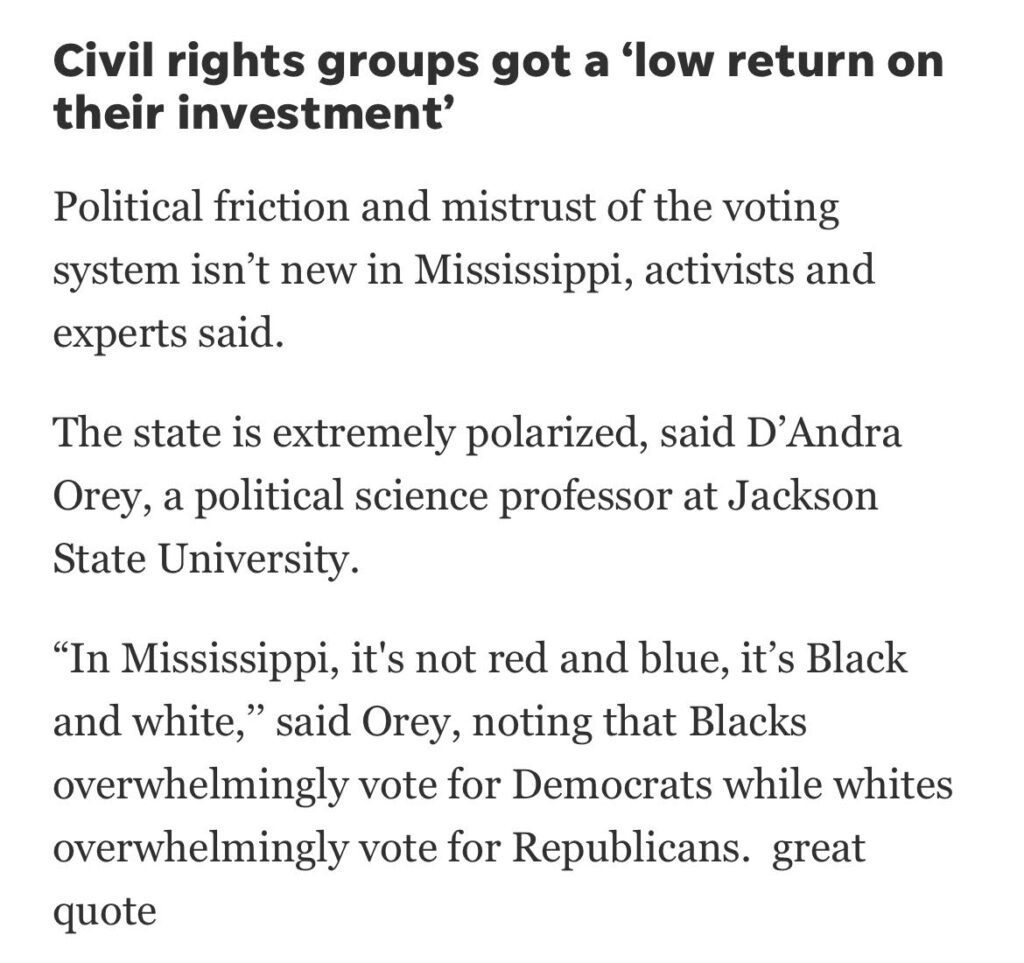
Brittany Denson, a poll monitor, left, recalls problems a number of Hinds County precincts encountered during the general election in November, at a news conference in Jackson, Miss., on Thursday, Dec. 7, 2023, (AP Photo/Rogelio V. Solis)
Hinds County’s Democratic Election Commissioners face scrutiny from Congress and from activist organizations over reported ballot shortages on Election Day.
On Election Day, reports of ballot shortages at 9 of Hinds County’s 107 voting precincts set off a flurry of legal challenges and media coverage that continues to reverberate today.
On Tuesday of this week, U.S. Representative Bryan Steil, a Republican from Wisconsin, sent Hinds County Election Commissioners a letter raising concern about their conducting of this year’s November 7th general election.
Under Mississippi law, county election commissioners are responsible for conducting general elections within their jurisdiction. All five of Hinds County’s election commissioners are affiliated with the Democratic Party.
The law requires county election commissioners to print ballots for at least 60 percent of registered voters in a county. In Hinds County’s case, there are 165,892 people in the Secretary of State’s voter count rolls. According to the official election certification, 68,202 people, or only 41 percent of registered voters, cast ballots on November 7th in Hinds County.
Mississippi law also requires county election commissioners to determine at least ten days prior to an election the number of registered voters in each precinct within a county to ensure sufficient ballots are printed and distributed at the precinct level.
Steil oversees the Committee on House Administration, which has broad oversight over federal elections. His correspondence sought answers on how the Commissioners would prepare to ensure that reported ballot shortages in certain precincts within Hinds County did not occur again:
[P]lease identify what steps your office has taken to:
(i) learn from this ballot shortage and ensure no precinct in Hinds County, Mississippi, has a shortage in any upcoming federal election and every precinct receives the correct ballot style(s);
(ii) prepare for the 2024 federal primary and general elections in Hinds County, Mississippi; and
(iii) restore voter confidence and to ensure voters that the correct ballot will be available when they next attempt to vote in person.
On Thursday, a coalition of Civil Rights organizations that included The ACLU of Mississippi, NAACP, Southern Poverty Law Center, and The Mississippi Poor People’s Campaign, among others, gathered at the Hinds County Courthouse to demand answers and reform.
Speakers encouraged residents to attend the Election Commission’s regularly scheduled meeting on Tuesday, Dec. 12th at the Hinds County Courthouse to share their experiences on Election Day.
Amir Badat, special counsel at the NAACP Legal Defense and Education Fund told reporters, “We call on Hinds County voters to attend and provide public comment. Tell your elected officials about how these impacted your ability to vote. Ensure that your voice is heard.”
A Word on Coverage
Much of the coverage on the ballot shortages in Hinds County to date has made issue of Hinds County’s racial composition and Mississippi’s voting rights history. An early report by the Associated Press led with a paragraph that read:
It’s unclear how many people left without voting, and activists and local leaders say election officials’ failure is shocking, especially in a state where civil rights leaders were beaten or killed in the 1960s and earlier to secure voting rights for Black residents.
The article went on to explain the importance of Hinds County’s African American vote to Brandon Presley’s Democratic gubernatorial campaign and included quotes from African American residents suggesting the election had been rigged:
‘It’s frustrating and it sort of makes you feel like something was being rigged or something,’ Wells, who is Black, said Wednesday.
While the article did eventually note that the Hinds County Election Commissioners were all African American and Democrat, it did not explicitly define the election commissioners legal responsibility in printing and distributing a sufficient number of ballots.
Mississippi Today’s Taylor Vance’s article on the press conference yesterday noted that “the county is majority Black and an area that traditionally votes for Democratic candidates,” but did not mention the political affiliation or racial composition of the Hinds County Election Commission.
The Associated Press’s coverage yesterday did mention the Commissioners’ party affiliation and also noted that some of the precincts that ran out of ballots were in Clinton, a Republican area of Hinds County. In other words, that the reported ballot outages actually could have negatively impacted Republican vote in Hinds County.
National outlets have framed the story similarly, with scant mention of who is actually legally responsible for ballots, or the race and political affiliation of those individuals. A piece run by USA Today focused extensively on Mississippi’s voting rights history and racial dynamics without mentioning the race or party affiliation of the election commissioners. Apparently the editors at USA Today thought this was a “great quote” and forgot to omit that part when publishing (see comment at end of quote that appeared in article):

Mississippi should not whitewash its past, nor should it ignore the current racial composition of counties or the political dynamics of race. Those are issues worth exploring honestly, and if necessary, painfully.
The danger to be mitigated against, however, is in weaponizing the past. I am not implying that has been the intent of coverage. The omission of key facts, though, could play a role in the conclusions citizens reach and the perception outsiders have on what transpired in Hinds County on Election Day.
If a reader could be left with the perception that ballot shortages in Hinds County were a continuation of 1960s-level Civil Rights violations, or an effort to suppress Democratic or Black vote, pointing out that the people in charge of printing ballots are affiliated with the Democratic Party and are Black seems like important context.
CORRECTION: A previous version of this story incorrectly indicated that the Associated Press’s initial reporting on the Hinds County ballot shortage did not identify the political affiliation and race of the Hinds County Election Commissioners.










